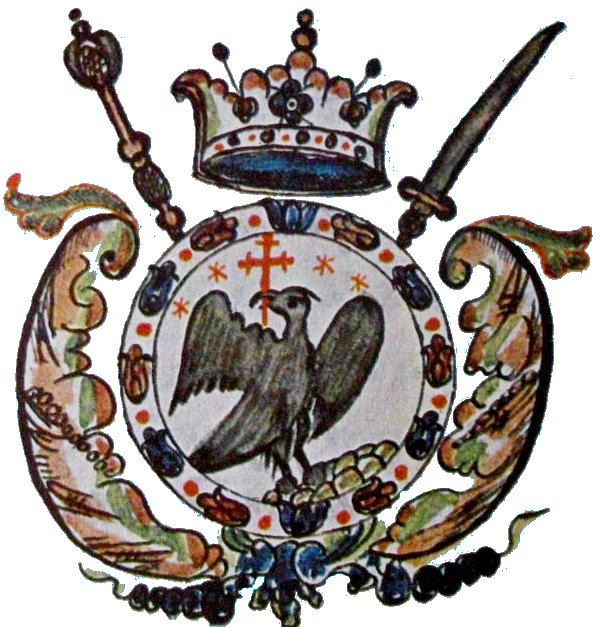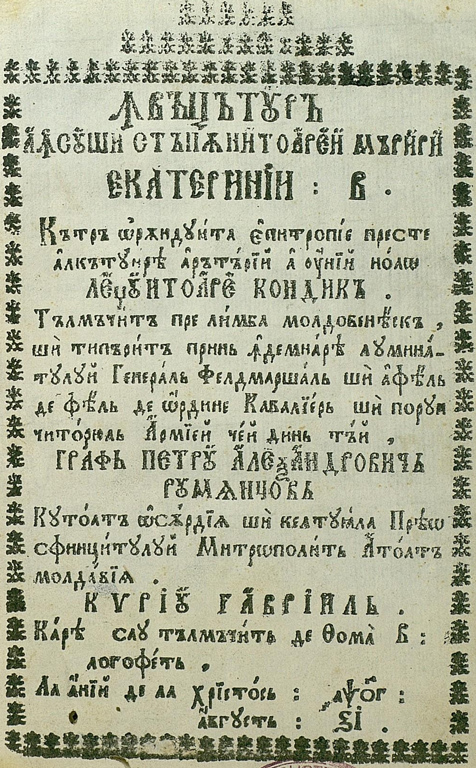POWORDS
The Power of Words
Propagandistic or Conspirational Manuscripts and Printings
in Moldavia and Wallachia (1769–1812)
CNCS project PN-III-P1-1.1-PD-2016-1766 no 84 din 02/05/2018
Project description

On the other hand, conspirational acts also took place, especially under the coordination of ‘initiates’ (fascinated by the new ideas promulgated at the dawn of the French Revolution), in possession of texts or manuscripts, through networks, with the new Western ideas. In the meantime, the Church, through its representatives, played a significant part, supporting either one faction or the other, favouring or blaming movements, ideas, thought paradigms. From an ideological perspective, the main tool used by the occupying forces was the word, printed or in manuscripts, acting as new power’s main vehicle. The effects of propaganda materialized through the spreading of ideas, by their distribution under forms accessible to all, but also in mystical, eschatological codes with a strong message attuned to religious feeling. The proclamations, memoirs, prefaces, legends, stories, books with ‘cherry-picked’ topics, projects, prophecies or hagiographies printed or hand-written, circulating and being read in endemic, even conspirational media illustrate a cultural phenomenon. Our project’s main purpose is to regard these first-hand sources critically, to carefully, synoptically analyse them and gather the results in a volume and in a few other studies where several unpublished materials will be edited.

Methodology
The research project is based on classical methods, i.e. the analytical method, specific to historical inquiry, using primary sources (documentary sources in particular), but also the comparative approach of the topic by correlating research with recent contributions in the field made in national and international historiography. The materials that are enlisted in the available catalogues will be supplemented by unknown texts that are to be found in small libraries and private collections. For the research of sources I will use research methods specific to the auxiliary sciences of history and archival studies, by using the knowledge in editing written documents in Romanian-Cyrillic paleography. I will also make use of the specific methods in researching the history of power, of writing and of the printing press, of the Church and of international relations. Editing the sources will be made according to all scholarly norms and criteria at the highest level, fully observing the academic methodology specific to the field. We will constantly appeal to new methods, too, after having carefully and thoroughly consulted the bibliography of the topic and the new publications in the field. New concepts in the vein of modern historical research will be used.
Main project objectives
Scientific advancement
Dissemination
Academic networking
Project leader
Dr Ioan-Augustin Guriță is a Lecturer at the “Alexandru Ioan Cuza” University of Iasi. His main areas of interest are the medieval and pre-modern history of Romania. He has published several articles and studies in these fields, while others are currently under press; another area of interest is the history of the Church in Romania (the fourteenth to nineteenth centuries), the history of Romanian culture and political ideas in the eighteenth and nineteenth centuries, the study of Romanian-Cyrillic palaeography, heraldry and genealogy.
Mentor
Professor Laurenţiu Rădvan has medieval and pre-modern urban history as his main field of expertise, focusing on institutional, economic, and social history.
Project reports
Achieved results
1. Ioan-Augustin Guriţă, Încercările unei generaţii. Putneni în administraţia bisericească din Moldova (a doua jumătate a secolului al XVIII-lea) [The Trials of a Generation. Monks from Putna Monastery in the Ecclesiastical Administration of Moldavia (Second Half of the 18th Century)], in “Analele Putnei” [The Annals of Putna], XIV, 2018, 1 (CEEOL, Index Copernicus).
2. Ioan-Augustin Guriţă, Contribuţii la istoria relaţiilor bisericeşti româno-ruse. Un document recuperate [Contributions to the history of Romanian-Russian ecclesiastical relations], on Gabriel Leanca (editor), Politică şi relaţii internaţionale în istoria românilor. Omagiu profesorului Gheorghe Cliveti [Politics and international relations in the history of Romanians. Homage to Professor Gheorghe Cliveti], “Alexandru Ioan Cuza” University Press Iaşi (CNCS B).
3. Ioan-Augustin Guriță, Despre Ștefan cel Mare și Moldova la sfârșitul secolului al XVII-lea. Note pe marginea unor fragmente de cronică târzie [About Stephen the Great and Moldavia at the End of the 17th Century. Remarks on a Late Chronicle], in “Analele Putnei” [The Annals of Putna], XIV, 2018 (published in 2019), 2 p. 157–190 (CEEOL, Index Copernicus).
4. Ioan-Augustin Guriță, La 341 de ani după căderea Constantinopolului: un manuscris, un sucevean și un fenomen cultural [341 Years after the Fall of Constantinople: a Manuscript, a Native of Suceava and a Cultural Phenomenon], in “Analele Putnei” [The Annals of Putna], XIV, 2018 (published in 2019), 2 p. 27–90 (CEEOL, Index Copernicus).
5. Ioan-Augustin Guriță, Un arhiereu putnean uitat: episcopul Antonie al Romanului [A forgotten Putna hierarch: bishop Antonie of Roman] (I), in “Analele Putnei” [The Annals of Putna], XV, 2019, 1, p. 215-226 (CEEOL, Index Copernicus).
6. Ioan-Augustin Guriță, Pages of Romanian History in the works of Andrei Lyzlov, in “Historical Yearbook”, volume XVIII, 2021, accepted for publication (CEEOL).
7. Ioan-Augustin Guriță, Un text polemic din a doua jumătate a veacului al XVIII-lea şi semnificaţiile sale [A polemic text from the second half of the 18th century and its meanings], in “Analele Ştiințifice ale Universității «Al. I. Cuza»”, Iaşi, s. n., Istorie [“Scientific Annals of «Al. I. Cuza» University”, Iași, s. n., History], 66, 2020, volume XXI, 2020, accepted for publication (CEEOL).
1. Ioan-Augustin Guriţă, Between Empires and Ideologies. Political Projects, Cultural Transfer and Propaganda in Moldavia and Wallachia during the Russo-Turkish Wars (1768-1774, 1787-1792), Balkan Worlds IV, The ‘Great Ideas’ of the Balkans (18th – 20th c.), organized by the Dept. of Balkan, Slavic and Oriental Studies, University of Macedonia in collaboration with Association Internationale d’Études du Sud-Est Européen and Laboratory of History of the Department, University of Macedonia, Thessaloniki, November 29th – December 1st, 2018 (https://balkanworlds.edu.gr/final-programme/).
2 .Ioan-Augustin Guriţă, Un arhiereu putnean uitat: episcopul Antonie al Romanului [A Forgotten Monk from Putna: Bishop Anthony of Roman (I)], “Colocviile Putnei” [Putna Colloquia], 21st edition, 11th-15th July, Putna Monastery. (https://www.centrulstefancelmare.ro/ro/activitati/colocviile-putnei-editia-a-xxi-a/)
3. Ioan-Augustin Guriță, Pagini de istorie bisericească mai puțin cunoscute din primii ani ai stăpânirii austriece în nordul Moldovei [Less known ecclesiastical history pages in the first years of the Austrian domination in Northern Moldavia], “Colocviile Putnei” [Putna colloquia], 23rd edition, Putna-Dragomirna, 2019 (https://www.centrulstefancelmare.ro/en/activitati/putna-colloquia-23rd-edition/).
4. Ioan-Augustin Guriță, The Byzantine Empire in Romanian Manuscripts from the 18th Century: Prophecies, Histories, Hagiographies, The 7th Annual Conference of Medieval, Renaissance and Early Modern Studies, 15-19 April, Nicosia, Cyprus (https://www.othellosisland.org/copy-of-2018-provisional-programme).
5. Ioan-Augustin Guriță, The Romanian Church and the Uprising of / Η Ρουμανική Εκκλησία και η Εξέγερση του 1821, within “Balkan Worlds V: The Balkan Dimensions of the 1821 Greek Revolutoin” / Βαλκάνιοι Κόσμοι V: Οι Βαλκάνιες διαστάσεις της Ελληνικής Επανάστασης του 1821, Thessaloniki, Greece, 27-29 February 2020 (https://balkanworlds.edu.gr/final-programme/).
6. Ioan-Augustin Guriță, Ţările Române şi „reînvierea” Imperiului Bizantin în veacul al XVIII-lea. Proiecte, propagandă, efecte [The Romanian Principalities and the “revival” of the Byzantine Empire in the 18th century. Projects, propaganda, effects], The International Scientific Conference “History and Theology”, Constanţa, 17th-18th November 2020 (http://teologie.univ-ovidius.ro/pagini/sesiuni-stiintifice).
1. Ioan-Augustin Guriţă, Un text polemic din a doua jumătate a veacului al XVIII-lea şi semnificaţiile sale [A polemic text from the second half of the 18th century and its meanings], Simpozionul „Artă şi civilizaţie medievală”, ediţia XXV, Colocviul Scris şi scriitură în Evul Mediu românesc [“Medieval art and Civilisation” Symposium, 25th edition, Colloquium Written and writing in the Romanian Middle Ages], Suceava History Museum, 8th-9th November 2018 (https://muzeulbucovinei.ro/arta-si-civilizatie-medievala-editia-a-xxv-a-8-9-noiembrie-2018/).
2. Ioan-Augustin Guriţă, Lămuriri privind înfiinţarea, evoluţia şi competenţa unei instituţii din a doua jumătate a veacului al XVIII-lea: Dicasteria Mitropoliei Moldovei [Clarifications on the constitution, evolution, and competence of an institution of the second half of the 18th century: the dikasterion of the Moldavian Metropolis], Zilele Universităţii „Alexandru Ioan Cuza”, simpozion naţional, Sesiunea de comunicări a cadrelor didactice şi a cercetătorilor [Days of “Alexandru Ioan Cuza” University, national symposium, Paper session for didactic personnel and researchers], 26th October 2018 (http://history.uaic.ro/wp-content/uploads/2018/10/program-zile-univ-A5-2018.pdf).
3. Ioan-Augustin Guriță, Dascăli putneni din veacul al XVIII-lea [The Putna teachers from the 18th century], “Colocviile Putnei” [Putna colloquia], 22nd edition, 12th Februry 2019, “N. Iorga” History Institute, Bucharest (https://www.centrulstefancelmare.ro/en/activitati/putna-colloquia-22nd-edition/).
4. Ioan-Augustin Guriță, O „însămnare” din 1789 și importanța ei [A “note” of 1789 and its importance], monthly session of the Heraldry, Genealogy, and Sigillography Commission, Iași, 12th March 2019 (https:// www.irgh.org/?%C5%9Eedin%C5%A3e_lunare_de_comunic%C4%83ri___2019___Martie).
5. Ioan-Augustin Guriță, Rugăciuni pentru cazuri de epidemii și boli în spațiul românesc (sec. XVIII-XIX) [Prayers for epidemics and diseases in the Romanian space (18th-19th centuries)], within the workshop Înfruntând un “inamic” invizibil. Politici administrative, practici medicale și comportamente sociale în Țările Române în context epidemic (secolele XVIII-XIX) [Confronting an invisible “enemy”. Administrative policies, medical practices, and social behaviours in the Romanian Principalities in an epidemic context (18th-19th centuries)], “A.D. Xenopol” History Institute, 4th October 2019 (http://adxenopol.academiaromana-is.ro/images/program_oct2019.pdf)
6. Ioan-Augustin Guriță, – „Creştea cu putere cuvântul Domnului şi se întărea”. Fragmente biblice în tipărituri şi manuscrise româneşti din secolele al XVIII-lea şi al XIX-lea [“Growing and becoming stronger by the power of God”. Biblical fragments in Romanian prints and manuscripts of the 18th and the 19th centuries], The Cultural-theological Conference “The Bible – the best answer for whoever wants to find the meaning of life”, The Archbishopric of Suceava and Rădăuţi, Suceava, 13th November 2020 (https://www.crainou.ro/2020/11/19/conferinta-cultural-teologica/).